Seth Frantzman gives us an in-depth look at the triumphs and travails of the men and women fighting ISIS on the front lines.
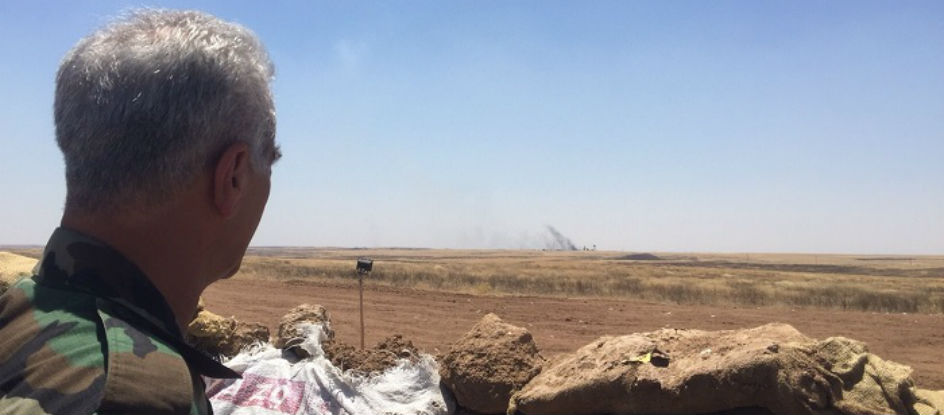
The desert grasslands around Mosul are parched and hot. Northern Iraq is not a place one would want to serve as a soldier in a trench line. But this is where fate and history have placed the Kurdish Peshmerga to fight the threat from ISIS. Rickety-metal frame beds sit under tarps abutting an earthen embankment. At the top of the embankment, the Kurds have placed sandbags and built parapets at either ends of the military position, covered with corrugated roofs. On one side sits an old black metal DShk, a heavy machine gun that fires a .50 bullet from a belt fed box. For a design that dates from 1946, this powerful weapon, with its double-triggers, has staying power, having seen action in wars from Vietnam to today.
The Kurds are proud of their position. Their commander, a 45 year old captain with frizzy hair, a tan vest and baggy traditional Kurdish-style pants shows us around. “Look, here is a ladder ‘da’esh’ [the Arabic term for ISIS] used to attack our position last month.” It’s a pathetic thing: a home-made ladder, propped up against the earthen wall. Two ISIS fighters rushed the position over the mile of open ground between the Kurdish line and the ISIS held village. They hoped to use the ladder to scale the embankment. A middle-aged Kurdish fighter with an AK-47 shot the ISIS men down.
The commander shows us the photo of his men posing with the bodies. “We checked them, they look like foreigners but we couldn’t find IDs.” They burned them and left them out in the grassland. The Kurds have put up floodlights in front of the position since ISIS uses nightfall to attack. This is war in its oddest form: it may be 2015 but the tactics remind one of the First World War. Soviet-era equipment is normal, and yet ISIS has the good weapons including night-vision equipment, captured from the Iraqi army, which received it from the US.
During the day all seems quiet. Smoke pours from the ISIS-held abandoned Christian village in the distance. “We receive mortar fire often, but that’s it.” This is the front line of the war on the extremists. But it is a static line. The Peshmerga are defending it well. They are not advancing and they have no plans to advance closer to Mosul. Rumors are that Mosul is festooned with booby-traps.
“We won’t sacrifice lives for the Arabs,” explains one Kurdish fighter. They reference the fighting further south near Baiji, southwest of Kirkuk, a large oil town on the Tigris. There the Shia militias are in close combat with ISIS. The Kurds are pressing out from Kirkuk to give that Kurdish town breathing room. Lacking supplies from the US and the West, the Kurds are unable to make major progress, and they refuse to sacrifice their men for a war that was imposed upon them from outside. We went to Erbil to meet the Peshmerga and get a look inside the Kurdistan Regional Government which runs the autonomous region in northern Iraq.
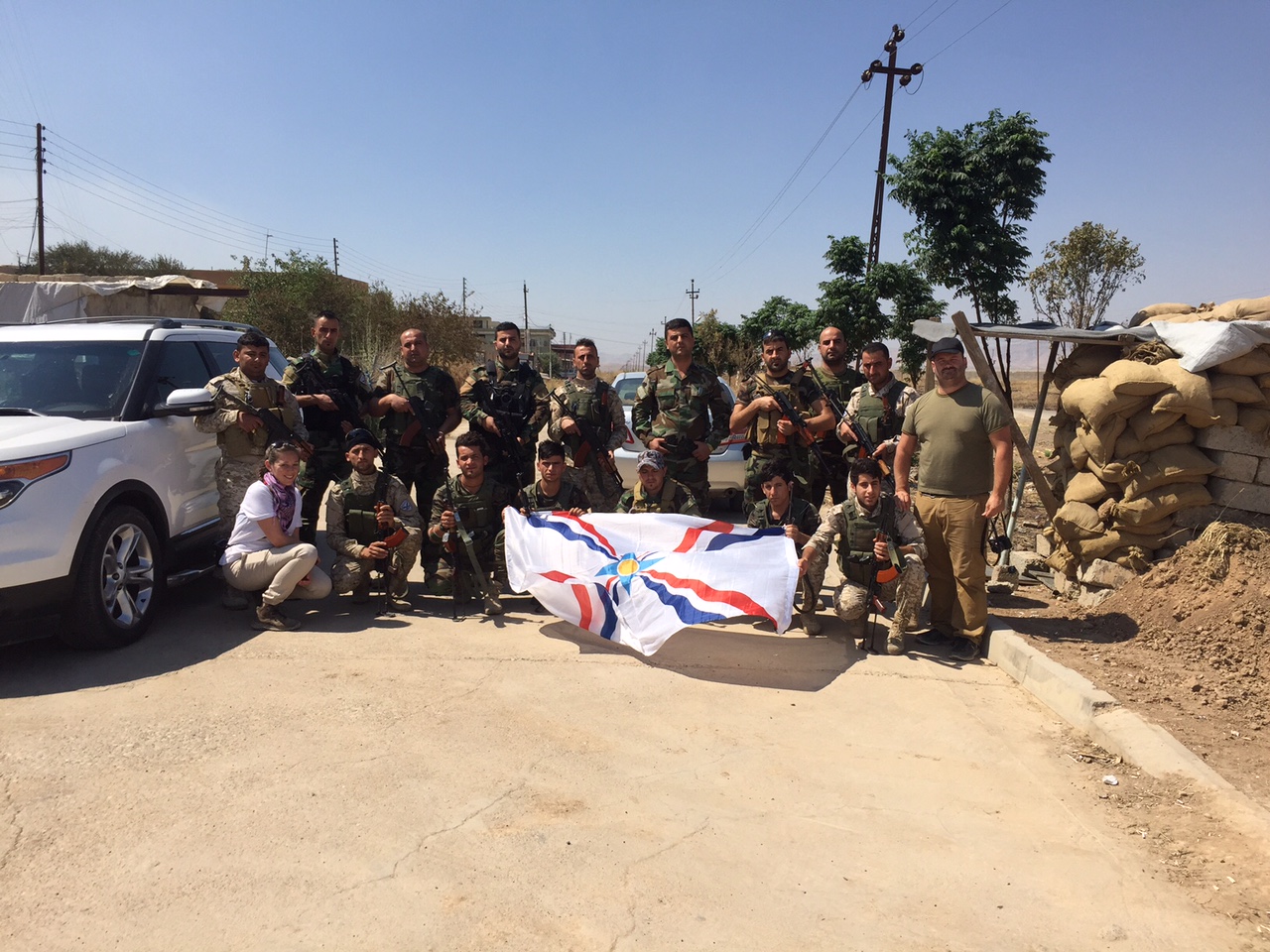
Welcome to Erbil
Flying into Erbil, the capital of Iraq’s autonomous Kurdish region the Royal Jordanian flight took a sharp arc to the East. Presumably, this was to avoid flying too close to the ISIS positions northwest of Kirkuk. Looking out the window one could see smoke. Evidence of fighting? It turned out later that due to the heat of the summer—upwards of 100 degrees on these flat parched grasslands—there were a lot of fires, not all of them caused by shelling or battles.
Erbil International Airport is small but modern, having been built by a Turkish company several years ago. Private cars are not permitted to drive up to the terminal and passengers must board a bus to get to a second holding area where they are welcomed.
It was 6am, our first day in the trip to find ISIS and meeting the Kurdish Peshmerga army that has held the extremists in check for more than a year. The first thing that one notices in Kurdistan is that there is nothing Iraqi about it. There are no Iraqi flags, only the Kurdish tricolor with the blazing sun in the middle.
Our first contact there was named Zach Huff. A 22-year old from Idaho, he had moved to Israel to volunteer with the IDF and decided last year that the Kurdish cause was in need of support. He joined the Zerevani Peshmerga and sought to help with training of their units.
The Peshmerga are divided into sections, a remnant of the guerilla war they fought against Saddam Hussein. One section is allied to the PDK’s Massoud Barzani, the President of Kurdistan who rules Erbil. The other is closer to the PUK, the other major political party that is based in Soleimani and is run by Jalal Talabani. When it comes to fighting ISIS there is no difference between these groups, but historically there are deep tensions in Kurdish society.
Zach moved from aiding the Kurdish fighters to working on political and refugee issues with governing officials. He is one of a small group of expats in the Kurdish capital. Despite the fact that Kurdistan is peaceful, it has the reputation of being part of Iraq. It doesn’t help that the capital city is thirty miles or so from ISIS positions. “People don’t understand there is a wall of Peshmerga between us and ISIS,” explained Zach.
We drove down the wide boulevards of the capital. It was quiet. Kurds have a strange culture of keeping their cars “like new” and leaving the plastic wrapping as much as possible in the interior. It is one of many unique cultural aspects. Kurds drink tea for instance, whereas the Arabs in Iraq tend towards coffee. A lot of them seem to prefer slim cigarettes. While mosque attendance is considered to be low, around 10-30 percent, almost 90% of Kurds refrain from alcohol.
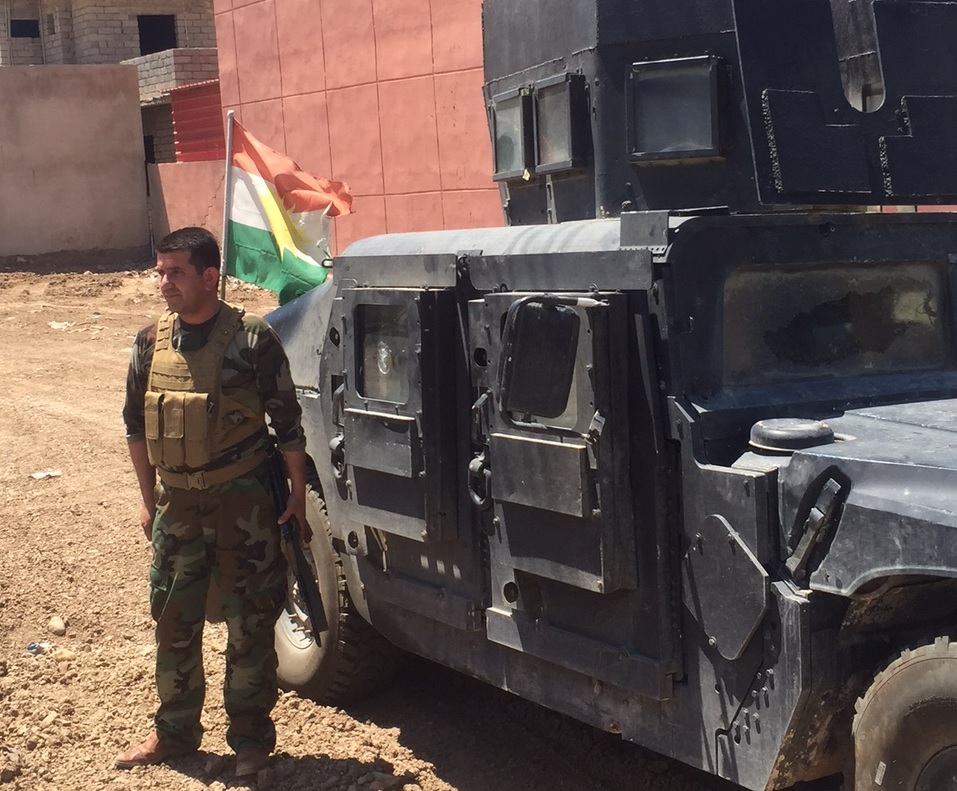
A semi-state in flux
Kurdish society is undergoing a traumatic transition. Up until 1991 they were victims of brutal persecutions. Saddam killed 180,000 in his Anfal campaign and destroyed thousands of villages. “All the men were in prison or in the mountains fighting,” recalls a PUK politician. Those were the dark years. But after America drove Saddam from Kuwait, Iraqi Kurdistan received breathing space. The million refugees returned. They came down from the mountains and elected a local legislature. Now Kurdistan has modern shopping malls, TGI Fridays, and KFC. There is no public transport; everyone seems to have a car and a lot of them are decent. Prices are steep; beer costs almost $8 for a glass. Gas is almost free at 25 cents a gallon.
But the arrival of ISIS has had two major effects. It briefly cut the major highway to Baghdad via Kirkuk and it led to 2 million Arab refugees, along with many Yezidis, Christians and others, pouring into Kurdistan. Some live in refugee camps that dot the countryside, while others live among the Kurds. Our hotel was staffed by Arabs from Mosul. In Duhok the sweets shop had all Arab workers. So Kurdistan, a country of victims, has become the host for the new victims. It is the stable strong power in the area, and the Arab neighbors are falling apart. Kurdistan also hosts a multiplicity of faiths; Christian churches are common in the cities.s Yezidis, Shabaks and other small indigenous groups live among them. Kurdish people stress this diversity and tolerance as the hallmark of their society.
But the enemy is ever-present. In Ainkawa, the Christian part of Erbil, there has been a suicide bombing and ex-pat bars have heavily armed Peshmerga at the door. At the malls one passes a metal detector and gets frisked (a woman is on hand to frisk the women). They take security seriously. Roads are pockmarked with checkpoints every 20 km or so. They don’t harass the people, but foreigners are expected to produce a passport. Americans, the passports we travelled under, are greeted with a thumbs up “yeah, America!”
They remember the good old days when the US airborne troops came down from the skies to help them fight Saddam’s legions. It won’t be forgotten, just like they don’t forget that in the 1960s Israel brought some of them to train in the Jewish state. “My uncle went through Iran to Israel to train. Israelis came here to the mountains to fight alongside us,” one fighter told us. Those were the days before the “great betrayal” of 1975 when Henry Kissinger sold out the Kurds in the Algiers agreement with Iran and Iraq and Saddam began to crush them.
The economy is struggling. Turkish trucks deliver goods from Turkey and the highways are lined by freight moving back and forth. But brownouts are common, with cities losing 6 hours of electricity a day or more. We would be sitting in a professor’s living room and the whole neighborhood would go dark, with everyone waiting for the generators to kick in.
Despite the story of Kurdish female fighters, the fact is that in Iraq Kurdish women are reserved and not a major sight in society. They aren’t behind burkas, in the houses we visited most women don’t cover their hair or cover it loosely. But women don’t go out to sit in the nargillah cafes. And the Kurdish Peshmerga here don’t seem to have many women in their units.
The country’s political system owes a lot to socialist origins. There are “peasant collectives” and “politburos” and “directorates” everywhere. But Kurds have a mixed relationship with the future. “We don’t have friends…the position today is stronger than ten or twenty years ago…we face many economic problems and with the government of Baghdad,” explained J.S, a Kurdish exile from Syria who has lived in Erbil for five years.
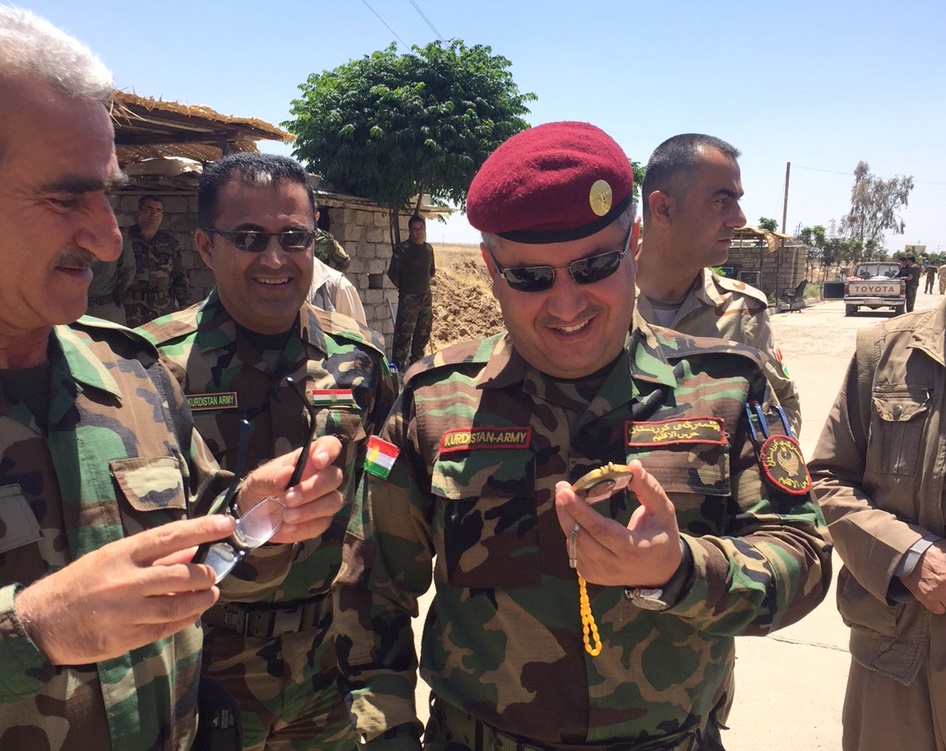
ISIS changed everything
In the days before ISIS, Kurdistan was trying to rebrand itself as “the other Iraq.” An Islamic party and a “change” party emerged to diversify politics. Hotels were packed with Arab tourists. But a former minister who spoke to us recalled how it all changed on in June 9th of last year. “We went to sleep and awoke with a new neighbor called ISIS controlling the Syrian border.” Iraqi and Syrian guards had fled. The barbarians were at the gates. The PUK urged a pre-emptive strike: Hit ISIS before it could marshal its forces. But the government tarried and debated. And the enemy crept forward. It swept southeast into Mosul and then into Shingal, the mountains near the Syrian border where Yezidis live.
To understand what happened we travelled two hours north of Erbil to the beautiful mountain city of Duhok. Our local contact, Vager Saadullah was a journalist before ISIS came; now he works part time with foreign journalists. We drove over the mountains into the Nineveh plains that surround Mosul. The land was yellow and the grass burnt. We could see the lake above Mosul dam. It had been an intense battle to keep ISIS away from this strategic water spigot.
We went through checkpoints and came to an abandoned Christian village. To understand the Peshmerga is to see an army that has an imminently human face. Men buy their own uniforms and weapons. It is a citizens’ volunteer force of several hundred thousand: paid around $500 a month, some miss their paychecks because the Kurdish government is being starved for oil revenues by Baghdad. But these men are the kind that would fight without money or commanders to lead them. They cradle the old Russian AK-47s. Some have M-16s that they captured from ISIS which captured them from the Iraqi army. “Most of our commanders fought the Iraqis in the mountains. That is what makes us different. We liberated our areas.” These men recall the poison gas attacks.
But when ISIS swept over their positions using American weapons captured from the Iraqi army which had abandoned around 2,300 Humvees, the Kurds could not stand against them with their rifles. “We had a shortage of weapons to use against armored vehicles. In August we lost many villages,” recalls General Sardar Karim. Karim cradles his Walther 9mm pistol.
His men are smiling. “It was in those days that Massoud Barzani came here and he became a commander and stood with us and reorganized the Peshmerga. He taught us to stand against the enemy.” Kurds tend to say “our only friends are the mountains,” but here they had to fight in the grasslands. And fight they did, throwing ISIS back from the Christian towns.
“Many veterans came to the front line as volunteers, we had no problems with the number of Peshmerga. The problem was the weapons the enemy was using.” The General says his men were prepared to die for their lands, they describe the “martyrs” who fell in each battle. The Kurdish fighters have a deep respect for each life that was lost—and they contrast this with the “brutal and cruel” enemy. “Their fighters want to die, that is the difference.” They describe being attacked by men dressed as women. Suicide bombers assault the position with home-made ladders and suicide vests.

Needing weapons, not men
But these Peshmerga are serious. They have erected a long earthen berm for miles to protect their defensive sandbagged positions. DShk heavy machine guns scan the horizon for the enemy and lights to survey the battle field are erected in front of the position. Frame beds are all they have to sleep on. The myth is the Peshmerga need fighters. But the commanders said they have more than enough volunteers. “Just give us MILAN anti-tank missiles.”
Lack of weapons is the major problem, not lack of men. The Kurdish men, many of them in their late 30s and 40s, are proud to fight. And they are good fighters. One old man proudly shows the AK that he used to kill the ISIS men who came at them one morning at 4 am last month. “He shot them with a Soviet rifle,” his commanding officer boats. They kept the ladder the enemy brought to scale the position. They burned the body and left them in the field. “We searched them, they were foreigners but we couldn’t find I.D.s” I can’t help but smile to think of an old man killing these foreigners who came to rape and pillage a country they knew nothing about, and who were unprepared to face these kind of fighters.
The Kurdish fighters are being boosted by foreign volunteers. On the Kirkuk front, a 29 man and 1 woman platoon is serving with them. Samantha Jay, the American female face of the unit, is a frequent poster on Instagram. Her unit lacks basic equipment like night vision and med kits. “We have five hummers in the sector and two of them have problems on a daily basis,” Alex Pineschi relates. ISIS has optic and M-4 rifles, and all the equipment captured from the Iraqi army and the Peshmerga and their allies have nothing. The Peshmerga generals were more cynical about it. “You know how we get our guns. ISIS gets them from the Iraqi army and we kill ISIS and get it from them.” Many Kurds are convinced the Iraqi army purposely retreats and gives the weapons. “They are the greatest cowards in the world, fire two bullets at them and they run away.”
The Peshmerga also have Christian volunteer units in their ranks. Down the road from their positions which are 30 km from Mosul is a small unit of Nineveh Plains Forces. The Christians have also bought their own weapons and kitted out a unit. The Peshmerga let them guard the Christian villages they have liberated. Their commander is from the village the Peshmerga liberated from ISIS. Their political party, the Chaldean Syriac Assyrian Popular Council, whose flag has the distinctive red and blue cross that symbolizes the two great rivers of Iraq, created the militia as part of a wider policy of gaining autonomous status for Christians in the Nineveh plains.
Among the Kurds there is a feeling the Arab fighters are not yet capable of holding a sector. It’s hard to argue with older guys who spent forty years in the militia and mountains fighting, when there are these young Christians, eager to fight, but who joined just five months ago. When we met with them it was clear their unit has little to do but sit around the houses they have occupied. There does not appear to be a plan to rotate them into frontline positions. However, further south near Kirkuk there are Christian units and foreign volunteers in them who have seen more action.
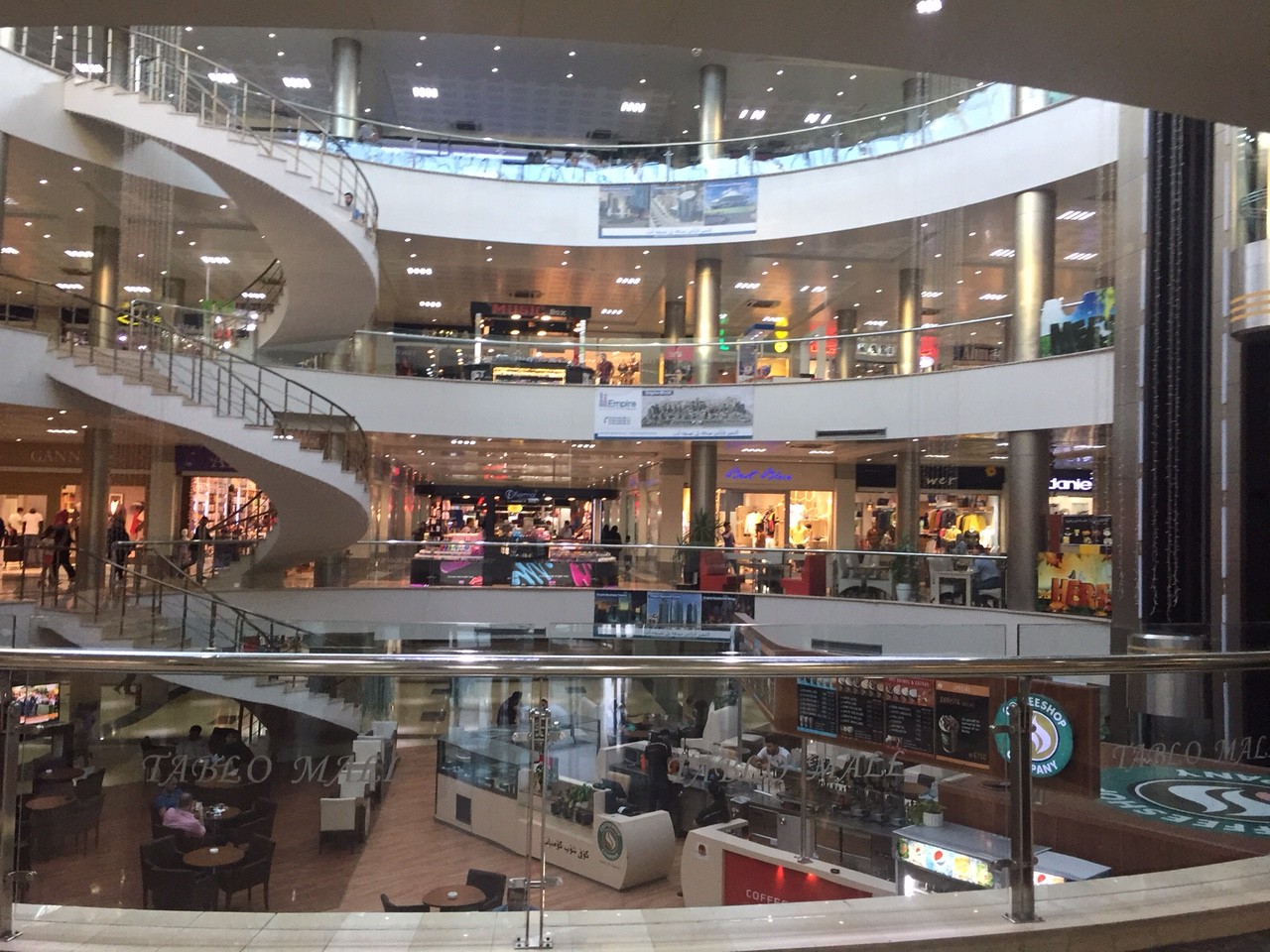
Getting used to refugee life
One of the issues Kurdistan Regional Government faces is the massive influx of 1.7 million Arab refugees from areas occupied by ISIS and the Iranian-backed Shia militias. Kurdistan has become a sort of dumping ground for the rest of Iraq. At the moment they are begrudging hosts. Most Kurds boast that their society is tolerant and hosts numerous religions. But not so long ago Kurds were complaining of Saddam’s attempts at “Arabization” of places like Kirkuk. Kirkuk is now mostly Kurdish, but with one in five residents of Kurdistan now Arab-speaking, the “Arabization” has been accomplished through the back door.
At Harsham camp outside of Erbil, the caravans and tents for the refugees are set up in rows. The camp has a fence around it and UNHCR has outsourced running it to a local group called Acted. A gaggle of different NGOs are involved in supporting the refugees, including Samaritans, the Taiwanese government, UNESCO, and a local charity named after Mullah Mustafa Barzani, the former leader of the PDK. Signs indicate the proper way to use a latrine (not going to the toilet outside, but indoors).
The most common place of origin for the refugees is from Mosul (531 out of 1,432). Others come from as far away as Anbar province. They seem to be all Sunni Arabs and almost half are children. They come in families, not as individuals, and most of the men try to find odd jobs in construction in Erbil. The Sunnis flee here because they cannot usually flee to Shia parts of Iraq for fear of harassment by Shia militias. One refugee from Tikrit told me that his family members were killed by Shia fighters and that the Shia are bringing in residents to take over the former hometown of Saddam. So these Sunnis may never be able to go home safely. Those from Mosul know that ISIS is digging in for the long-term and don’t see a chance to return. Harsham is merely one of the smaller camps; there are many others around Erbil.
Other types of refugees in the Kurdish region consist of Yezidis and Christians forced out by the ISIS advance into the Ninveh plains and Shingal areas near Mosul. But these refugees seem to be fitting in better. Many Christians have congregated in Ainkawa, a suburb of Erbil near the airport. Signs for beer line the streets and snazzy salons are attached to homes in various states of disrepair. A priest uses a half-completed mall to house refugees and churches, with fortress like walls, are common sights.
There have been suicide bomb attacks here: on April 17, 2015 a bomb near the US consulate injured a woman from the US and killed three. Now the Peshmerga have set up roadblocks around the scene of the attack, and armed men are a common site at the few bars expats frequent. There are some minor religious tensions here. At Palmyra bar, located on the top floor of a decent hotel, the tattooed Albanian female manager explains that they may not play music during Ramadan. But at T-bar, whose staff is mostly Filipina women, the menu consists of such drinks as “sex with the bartender” and “blow job.” Not too much conservative mores here.
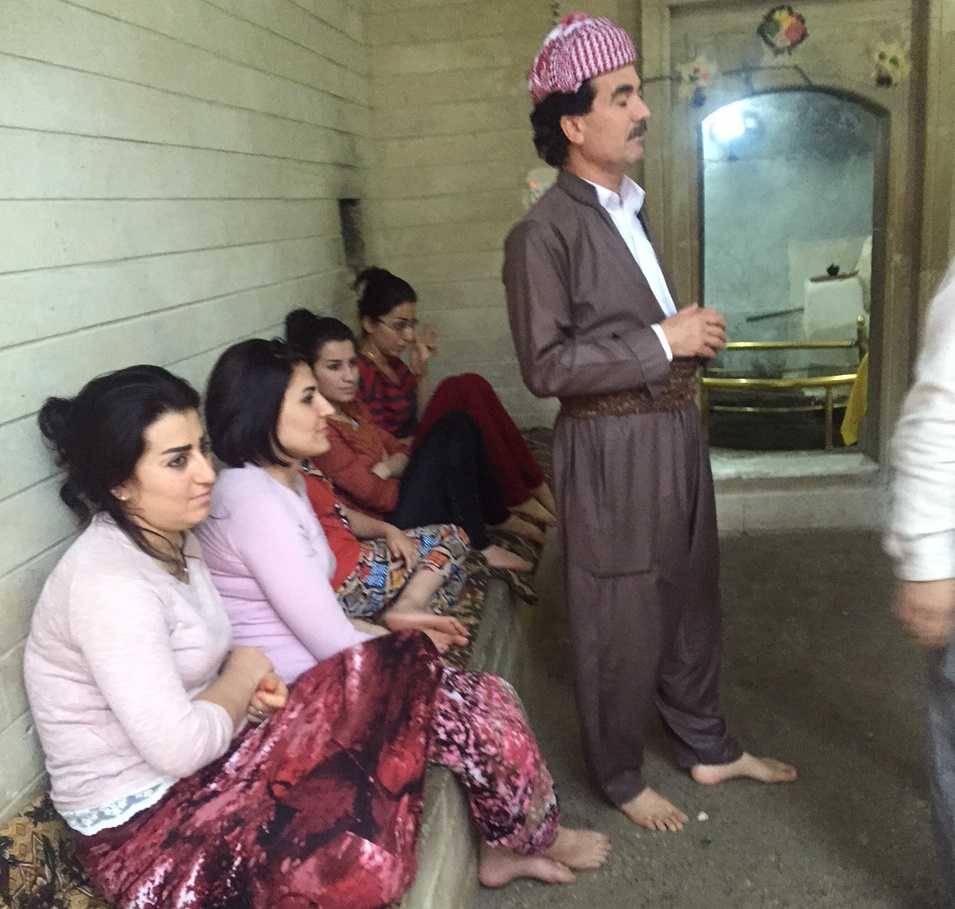
Kurdistan and the surrounding states
Kurdistan is also host to a large number of Kurdish refugees from Syria and Iran. Kurdish politics in both of these countries is complex. In the northeastern part of Syria the YPG, a far-left Kurdish party, has been the most successful in mobilizing against ISIS. It is marching forward, but it also dominates politics there. In Iran, Kurdish politics are totally curtailed.
Mustafa Hijri, the General Secretary of the Democratic Party of Iranian Kurdistan (KDPI) lives in Iraqi Kurdistan and was recently in Washington, DC to discuss politics across the border. Born in 1945, he has keen memories of life under the Shah and the suppressions after the Islamic Revolution in 1979. He sees Iran as a threat to the region, asserting that it is exporting its revolution among Shia parties in the area from Yemen to Lebanon and Iraq: “By supporting these different groups the Islamic Republic of Iran attempts to create instability and conflict all around the region in order to increase its own power and influence, and this policy have both direct and indirect impact on the Kurds. Iran chooses to spend billions of dollars on terrorist groups outside of Iran instead of investing inside the country.”
Dissent by the Kurds is totally crushed by the regime. “The regime sees the Kurds as a threat to its security and uses all forms of brutal methods to crack down on any form of dissent in Kurdistan,” he says. There are around 15,000 from Iran living in Iraqi Kurdistan now. When ISIS attacked last year, the PDKI volunteered to send its own fighters to help the KRG forces. Eventually the regional government asked them to withdraw their units and since then the KDPI units are in their own camps unable to participate in the conflict. This is likely due to the KRG’s own fears that it will cause tension with Iran. The KRG plays a balancing act between antagonizing either Iran or Turkey, both of which fear Kurdish independence.
Like all the Kurds we spoke to, Hijri wishes the US would do more for Kurds in Iraq and Iran. “We believe that the United States should help all Kurds and especially Kurds in Iranian Kurdistan in their struggle to become free from the oppression of the regime in Iran. This support is needed in order for the Kurds in Iranian Kurdistan to become a beacon for democracy in the region, just like the Kurds in Iraq are. Supporting us will help strengthening and spreading democracy in the region as whole.”
Another insight that Hijri has is asserting that there is a misunderstanding of Iran’s support of the war against ISIS. ISIS provided Iran an excuse to extend its tentacles into Iraq. The long-term impact of the Sunni extremists is to embolden the Shia and Iran to totally control Iraq. In the long term this will threaten the Kurds, not only because the Kurds are Sunni, but because Iran, like Turkey, does not want the Kurds to have too much independence.
The anti-Iranian view is not the view of every Kurdish government official; some of them see Iran as helping arm Kurdistan in the absence of US support. They also view an Iran deal with the US as a positive development. One former minister who asked to remain anonymous claimed that the international community had tried to isolate Iran for 30 years to no effect. “Iran is in Syria, Lebanon, Yemen, and affects Israel, Sinai, Bahrain, South Africa and South America…it is everywhere in the world. That was an unsuccessful policy. If we are afraid of nuclear weapons, they probably already have the weapon no doubt,” he claimed. A passionate believer in working closely with the Iraqis—and therefore the Iranian advisors—to push ISIS back from Kirkuk towards Mosul, he argued that an Iran mollified by being inside the international system would be better. “Within the system you can control them more.”
These Kurdish politicians argue that while independence is a legitimate right of the Kurdish people, they should move slowly. They want increased powers for Kurdistan and partnership inside a federal system. “We do not want one group to dominate Iraq. Since 2003 the Kurds have been the main force in Iraq.” The Baghdad government owes Kurdistan more than $18 billion dollars in withheld tax revenues and oil revenues. But they can wait. “ISIS was a wake-up call. We spent a longtime in Peshmerga and partisan life in the mountains and we can be more patient.” The politician jokes that “we have AC now,” contrasting this life with his life as a refugee and guerilla in the old days.
It is clear that the arrival of ISIS united Kurdistan. Currently the KRG has told its men to hold off from advancing on Mosul. The local officers admit the logic behind it: “Why should we die for the Arabs.” Kurds are very cognizant of losing any of their men in battle. Their concept is to protect the homeland, protect the minorities who have fled to them for safety and aid the Iraqi government in its slow-paced advance northwest of Kirkuk. Once that is finished the Kurds will have to decide what the future brings.
English translation by Avi Woolf.
To receive updates on new articles in English, join Mida on Facebook or Twitter or join our mailing list.



